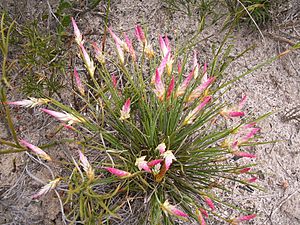Pipe lily facts for kids
Quick facts for kids Pipe lily |
|
|---|---|
 |
|
| In Lesueur National Park, Western Australia | |
| Scientific classification |
Johnsonia pubescens, also known as the pipe lily, is a plant that looks a lot like grass. It belongs to the plant family called Asphodelaceae. This special plant only grows in the southwest part of Western Australia. Like other plants in its group, the pipe lily has tiny flowers. These flowers grow on the end of a spike and are hidden by big, papery leaves called bracts.
Contents
What Does the Pipe Lily Look Like?
The pipe lily is a perennial plant, which means it lives for more than two years. It grows in clumps and has leaves that look like grass. All the leaves grow from the bottom of the plant. It also has underground stems called rhizomes that help it spread.
The leaves of the pipe lily are usually between 6.3 and 28 centimeters (about 2.5 to 11 inches) long. They are about 1 to 3 centimeters (0.4 to 1.2 inches) wide. The bottom parts of the leaves wrap around the plant's stem.
The plant's flowers grow on a leafless stem that is shorter than its leaves. These tiny flowers are surrounded by large, dry, overlapping bracts. These bracts can be white, or white with a pink stripe in the middle, or even a soft pink color. The whole plant feels soft because it's covered in short, gentle hairs.
Where Does the Pipe Lily Grow?
This plant is found in a specific area of Western Australia, stretching from Eneabba down to Serpentine. You can find it in different types of places like sandy areas (white, grey, or yellow sand), rocky areas with laterite or limestone, and even in wet spots or along roadsides.
Growing Your Own Pipe Lily
The pipe lily is a good plant to grow in a garden. It grows well from seeds. It likes to be in full sun and can grow in most types of soil, as long as it gets enough moisture.
Images for kids
-
A pipe lily in Lesueur National Park, Western Australia


